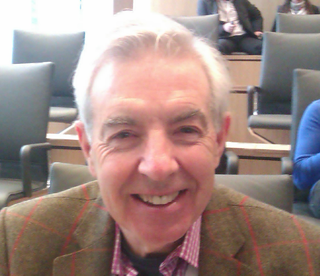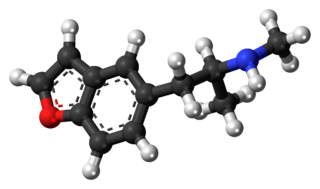Related Research Articles

3,4-Methyl
"Severe dopaminergic neurotoxicity in primates after a common recreational dose regimen of MDMA ("ecstasy")", is an article by George A. Ricaurte that was published in September 2002 in the peer-reviewed journal Science, one of the world's top academic journals. It was later retracted; instead of using MDMA, methamphetamine had been used in the test.
The Multidisciplinary Association for Psychedelic Studies (MAPS) is an American nonprofit organization working to raise awareness and understanding of psychedelic substances. MAPS was founded in 1986 by Rick Doblin and is now based in San Jose, California.

The National Institute on Drug Abuse (NIDA) is a United States federal government research institute whose mission is to "advance science on the causes and consequences of drug use and addiction and to apply that knowledge to improve individual and public health."

Sir Robin MacGregor Murray FRS is a British psychiatrist, Professor of Psychiatric Research at the Institute of Psychiatry, King's College London. He has treated patients with schizophrenia and bipolar illness referred to the National Psychosis Unit of the South London and Maudsley NHS Trust because they fail to respond to treatment, or cannot get appropriate treatment, locally; he sees patients privately if they are unable to obtain an NHS referral.
John Anthony Henry was a professor specialising in toxicology in the Faculty of Medicine, Imperial College London, at St Mary's Hospital in Paddington. He conducted research on the health effects of cannabis, cocaine and other recreational drugs.
Lacing or cutting, in drug culture, refer to the act of using a substance to adulterate substances independent of the reason. The resulting substance is laced or cut.
The Beckley Foundation is a UK-based think tank and UN-accredited NGO, dedicated to activating global drug policy reform and initiating scientific research into psychoactive substances. The foundation is a charitable trust which collaborates with leading scientific and political institutions worldwide to design and develop research and global policy initiatives. It also investigates consciousness and its modulation from a multidisciplinary perspective, working in collaboration with scientists. The foundation is based at Beckley Park near Oxford, United Kingdom. It was founded in 1998, and is directed by Amanda Feilding, Countess of Wemyss.
Amanda Claire Marian Charteris, Countess of Wemyss and March, also known as Amanda Feilding, is an English drug policy reformer, lobbyist, and research coordinator. In 1998, she founded the Foundation to Further Consciousness, later renamed to the Beckley Foundation, a charitable trust which initiates, directs, and supports neuroscientific and clinical research into the effects of psychoactive substances on the brain and cognition. She has also co-authored over 50 papers published in peer-reviewed journals, according to the Foundation. The central aim of her research is to investigate new avenues of treatment for such mental illnesses as depression, anxiety, and addiction, as well as to explore methods of enhancing well-being and creativity.
Drug classification: making a hash of it? is a 2006 report written by the UK Science and Technology Select Committee and submitted to the British House of Commons. The report suggested that the current system of recreational drug classification in the UK was arbitrary and unscientific, suggesting a more scientific measure of harm be used for classifying drugs. The report also strongly criticised the decision to place fresh psychedelic mushrooms in Class A, the same category as cocaine and heroin.

Drug policy of California refers to the policy on various classes and kinds of drugs in the U.S. state of California. Cannabis possession has been legalized with the Adult Use of Marijuana Act, passed in November 2016, with recreational sales starting January of the next year. With respect to many controlled substances, terms such as illegal and prohibited do not include their authorized possession or sale as laid out by applicable laws.

Mephedrone, also known as 4-methylmethcathinone, 4-MMC, and 4-methylephedrone, is a synthetic stimulant drug belonging to the amphetamine and cathinone classes. It is commonly referred to by slang names such as drone, M-CAT, White Magic, meow meow,and bubble. Chemically, it is similar to the cathinone compounds found in the Khat plant, native to eastern Africa.

David John Nutt is an English neuropsychopharmacologist specialising in the research of drugs that affect the brain and conditions such as addiction, anxiety, and sleep. He is the chairman of Drug Science, a non-profit which he founded in 2010 to provide independent, evidence-based information on drugs. In 2019 he co-founded the company GABAlabs and its subsidiary SENTIA Spirits which research and market alternatives to alcohol. Until 2009, he was a professor at the University of Bristol heading their Psychopharmacology Unit. Since then he has been the Edmond J Safra chair in Neuropsychopharmacology at Imperial College London and director of the Neuropsychopharmacology Unit in the Division of Brain Sciences there. Nutt was a member of the Committee on Safety of Medicines, and was President of the European College of Neuropsychopharmacology.

Drug Science or DrugScience (originally called the Independent Scientific Committee on Drugs (ISCD)) is a UK-based drugs advisory committee proposed and initially funded by hedge fund manager Toby Jackson. It is chaired by Professor David Nutt and was officially launched on 15 January 2010 with the help of the Centre for Crime and Justice Studies. The primary aim of the committee is to review and investigate the scientific evidence of drug harms without the political interference that could result from government affiliation.

5-MAPB, also known as 5-(N-methyl-2-aminopropyl)benzofuran, is an entactogen and designer drug of the amphetamine family that is similar to MDMA in its structure and effects.

Julie Holland is an American psychopharmacologist, psychiatrist, and author. She is the author of five books, including Weekends at Bellevue: Nine Years on the Night Shift at the Psych ER, a memoir documenting her experience as the weekend head of the psychiatric emergency room at Bellevue Hospital in New York City An advocate for the appropriate use of consciousness expanding substances as part of mental health treatment, she is a medical monitor for MAPS studies, which involve, in part, developing psychedelics into prescription medication.

Serotonin (5-hydroxytryptamine) is a monoamine neurotransmitter that plays a role in mood, eating, sleeping, arousal and potentially visual orientation processing. To investigate its function in visual orientation, researchers have utilised MDMA, or as it is commonly referred to, Ecstasy (3,4-methylenedioxymethamphetamine). MDMA is known to affect serotonin neurons in the brain and cause neurotoxicity. Serotonin has been hypothesised to be involved in visual orientation because individuals who use MDMA exhibit an increase in the magnitude of the tilt aftereffect (TAE). The TAE is a visual illusion where viewing lines in one direction, for an extended period of time, produces the perception of a tilt in the opposite direction to vertical lines subsequently viewed. This effect is proposed to occur due to lateral inhibition to orientation sensitive neurons in the occipital lobe. Lateral inhibition is where neurons that become activated to a particular orientation send inhibitory signals to their neighbouring neurons. The degree of orientation that each neuron becomes maximally excited to is referred to as the tuning bandwidth. Lateral inhibition consequently plays a pivotal role in each neuron's tuning bandwidth, such that if lateral inhibition no longer occurs, a greater number of neurons will become stimulated to the same orientation. This results in the activated neurons becoming adapted to the same orientation stimulus, if the stimulus is viewed for a period of time. As a consequence, if those neurons are subsequently 'shown' another stimulus that differs slightly in its orientation, those neurons are no longer able to achieve the same level of response as compared to other non-adapted neurons.
MDMA-assisted psychotherapy is the use of prescribed doses of MDMA as an adjunct to psychotherapy sessions. Research suggests that MDMA-assisted psychotherapy for post-traumatic stress disorder (PTSD), including complex PTSD (C-PTSD), might improve treatment effectiveness. In 2017, a Phase II clinical trial led to a breakthrough therapy designation by the U.S. Food and Drug Administration (FDA) for potential use as a treatment for PTSD.

Robin Lester Carhart-Harris is a British psychopharmacologist who is Ralph Metzner Distinguished Professor in the Department of Neurology at the University of California, San Francisco. Previously, he founded and was Head of the Centre for Psychedelic Research at Imperial College London.
References
- ↑ John Walsh. "Drugs Live: The Ecstasy Trial, Channel 4, Wednesday and Thursday". The Independent. Archived from the original on 2 October 2012. Retrieved 3 December 2016.
- ↑ Sample, Ian; correspondent, science (27 September 2012). "Drugs Live: The Ecstasy Trial – the highs and lows". The Guardian. ISSN 0261-3077 . Retrieved 28 January 2020.
{{cite news}}:|last2=has generic name (help) - ↑ "Drugs Live: Cannabis on Trial | Channel 4". www.channel4.com. Retrieved 28 January 2020.
- ↑ Postans, Adam (7 March 2015). "Adam Postans: Channel 4 made a hash of it with Drugs Live: Cannabis On Trial". mirror. Retrieved 29 January 2020.